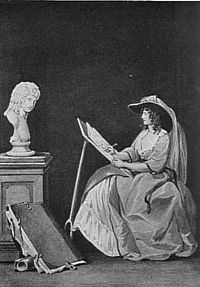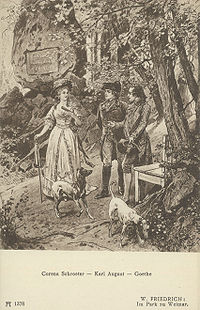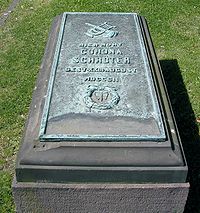
Corona Schröter
Encyclopedia


Germans
The Germans are a Germanic ethnic group native to Central Europe. The English term Germans has referred to the German-speaking population of the Holy Roman Empire since the Late Middle Ages....
musician best known as a singer. She also composed songs, setting works by Friedrich Schiller
Friedrich Schiller
Johann Christoph Friedrich von Schiller was a German poet, philosopher, historian, and playwright. During the last seventeen years of his life , Schiller struck up a productive, if complicated, friendship with already famous and influential Johann Wolfgang von Goethe...
to music.
Early life
Schröter was born in GubenGuben
Guben is a town on the Lusatian Neisse river in the state of Brandenburg, Germany. Located in the Spree-Neiße district, Guben has a population of 20,049...
. In her early years she studied many instruments, which included the keyboard
Keyboard instrument
A keyboard instrument is a musical instrument which is played using a musical keyboard. The most common of these is the piano. Other widely used keyboard instruments include organs of various types as well as other mechanical, electromechanical and electronic instruments...
and guitar
Guitar
The guitar is a plucked string instrument, usually played with fingers or a pick. The guitar consists of a body with a rigid neck to which the strings, generally six in number, are attached. Guitars are traditionally constructed of various woods and strung with animal gut or, more recently, with...
. Her father, Johann Friedrich Schröter, an oboist
Oboe
The oboe is a double reed musical instrument of the woodwind family. In English, prior to 1770, the instrument was called "hautbois" , "hoboy", or "French hoboy". The spelling "oboe" was adopted into English ca...
, was her first teacher, who also taught his three other children music. Her brothers, Johann Samuel and Johann Heinrich, were a pianist
Piano
The piano is a musical instrument played by means of a keyboard. It is one of the most popular instruments in the world. Widely used in classical and jazz music for solo performances, ensemble use, chamber music and accompaniment, the piano is also very popular as an aid to composing and rehearsal...
and a violin
Violin
The violin is a string instrument, usually with four strings tuned in perfect fifths. It is the smallest, highest-pitched member of the violin family of string instruments, which includes the viola and cello....
ist respectively, and her sister, Marie Henriette, was also a singer.
When she was thirteen, Schröter and her family moved to Leipzig
Leipzig
Leipzig Leipzig has always been a trade city, situated during the time of the Holy Roman Empire at the intersection of the Via Regia and Via Imperii, two important trade routes. At one time, Leipzig was one of the major European centres of learning and culture in fields such as music and publishing...
. It was there that she caught the attention of composer Johann Adam Hiller (it is thought that Hiller's wife was Corona's godmother). Hiller, an opera
Opera
Opera is an art form in which singers and musicians perform a dramatic work combining text and musical score, usually in a theatrical setting. Opera incorporates many of the elements of spoken theatre, such as acting, scenery, and costumes and sometimes includes dance...
tic and singspiel
Singspiel
A Singspiel is a form of German-language music drama, now regarded as a genre of opera...
composer, had become seriously frustrated with the inadequate education offered to women. To remedy this, in 1771 Hiller opened his own school. In this coeducational setting, students learned a wide variety of musical subjects, including solfège, diction, technique, Italian
Italian language
Italian is a Romance language spoken mainly in Europe: Italy, Switzerland, San Marino, Vatican City, by minorities in Malta, Monaco, Croatia, Slovenia, France, Libya, Eritrea, and Somalia, and by immigrant communities in the Americas and Australia...
, and the keyboard. Schröter flourished as a singer, but when compared to her fellow student and rival, Gertrud Schmeling (Madame Mara) in Hiller's Grosse Konzerte series, Schröter's voice was not as powerful as Schmeling's, possibly due to poor training which may have damaged her voice. However, she had an intensity which her admirers considered to be unrivalled.
Weimar
During her time at Hiller's school, Schröter became good friends with Johann Wolfgang von GoetheJohann Wolfgang von Goethe
Johann Wolfgang von Goethe was a German writer, pictorial artist, biologist, theoretical physicist, and polymath. He is considered the supreme genius of modern German literature. His works span the fields of poetry, drama, prose, philosophy, and science. His Faust has been called the greatest long...
, and when he moved to Weimar
Weimar
Weimar is a city in Germany famous for its cultural heritage. It is located in the federal state of Thuringia , north of the Thüringer Wald, east of Erfurt, and southwest of Halle and Leipzig. Its current population is approximately 65,000. The oldest record of the city dates from the year 899...
in 1775 he brought her along as a court singer for Duchess Anna Amalia. She first performed in the court on 23 November 1776. However, while she was employed as a singer, Corona became involved with the amateur court theatre, performing in at least eighteen productions, many of which were written by Goethe himself; on a few occasions, he starred opposite her, as in the performance of his play Iphigenie auf Tauris in 1779. Goethe's singspiel Die Fischerin was especially important to Schröter. She not only starred in the leading role of Dortchen, but composed incidental music for the play, including the famous opening song Der Erlkönig, which is quite different from the version composed by Franz Schubert
Franz Schubert
Franz Peter Schubert was an Austrian composer.Although he died at an early age, Schubert was tremendously prolific. He wrote some 600 Lieder, nine symphonies , liturgical music, operas, some incidental music, and a large body of chamber and solo piano music...
over 30 years later - unsurprisingly, Schröter's version is closer to the early Classical era lied tradition in the style of Zelter
Carl Friedrich Zelter
Carl Friedrich Zelter was a German composer, conductor and teacher of music.Zelter became friendly with Johann Wolfgang von Goethe, and his works include settings of Goethe's poems...
than to the Romantic version of Schubert.
When the amateur court theatre was replaced by professional actors in 1783, she continued to sing and act in informal settings. She also began to teach singing and took up writing and art. She formally withdrew from all court performing in 1788. She became friends with Friedrich Schiller
Friedrich Schiller
Johann Christoph Friedrich von Schiller was a German poet, philosopher, historian, and playwright. During the last seventeen years of his life , Schiller struck up a productive, if complicated, friendship with already famous and influential Johann Wolfgang von Goethe...
during those years, whose poems she later set to music. Unfortunately, these lied
Lied
is a German word literally meaning "song", usually used to describe romantic songs setting German poems of reasonably high literary aspirations, especially during the nineteenth century, beginning with Carl Loewe, Heinrich Marschner, and Franz Schubert and culminating with Hugo Wolf...
er are lost, as are her two dramas, hundreds of aria
Aria
An aria in music was originally any expressive melody, usually, but not always, performed by a singer. The term is now used almost exclusively to describe a self-contained piece for one voice usually with orchestral accompaniment...
s and duets, and an autobiography given to Goethe in 1778. However, two collections of lieder were published by her, the first in 1786, followed by another in 1794, thus surviving into the present time. The first collection, which contains her rendition of Der Erlkönig from Goethe's play, was more popular than the second, probably due to its simpler nature: the second contained many songs in French
French language
French is a Romance language spoken as a first language in France, the Romandy region in Switzerland, Wallonia and Brussels in Belgium, Monaco, the regions of Quebec and Acadia in Canada, and by various communities elsewhere. Second-language speakers of French are distributed throughout many parts...
and Italian. These two collections are some of the first and largest publications of lieder by a woman. When the first collection was released, Schröter had this to say about her work:
I have had to overcome much hesitation before I seriously made the decision to publish a collection of short poems that I have provided with melodies. A certain feeling towards propriety and morality is stamped upon our sex, which does not allow us to appear alone in public, and without an escort: Thus, how can I otherwise present this, my musical work to the public, than with timidity? For the complimentary opinions and the encouragement of a few persons… can easily be biased out of pity. The work of any lady, moreover, will indeed arouse similar pity to some extent in the eyes of other experts.
A review of this first collection said that Schröter's abilities for composing were not equal to her potential. The reviewer felt that the songs had much spirit in them, but were not written in a way that brought this out. He did say that the performances of these pieces were helpful to understanding the depth of them. Ultimately, he blamed this deficiency on her lack of education, a real problem for women in this period of time.
Corona Schröter was also immortalized in other ways. In 1782, during a eulogy
Eulogy
A eulogy is a speech or writing in praise of a person or thing, especially one recently deceased or retired. Eulogies may be given as part of funeral services. However, some denominations either discourage or do not permit eulogies at services to maintain respect for traditions...
for a deceased theatre director, Goethe praised her for her help in shaping theatre in Weimar, and himself. Seven years earlier, a work about theatre history was dedicated to her due to her well-known abilities.

Ilmenau
Ilmenau is a town located in the district of Ilm-Kreis, Thuringia, Germany.Ilmenau is situated in the valley of the Ilm river, at an altitude of 431 metres above sea level, and is the biggest town in Ilm-Kreis district, with 6,200 students studying at the Technische Universität Ilmenau. The...
with her long-time friend Wilhemine Probst in 1801. Her condition was so serious that she never recovered and died there a year later.

